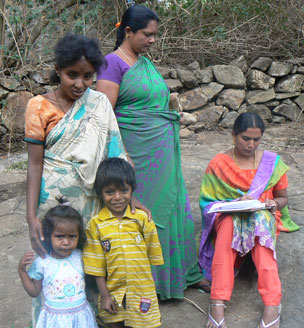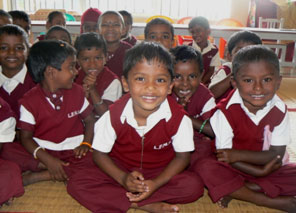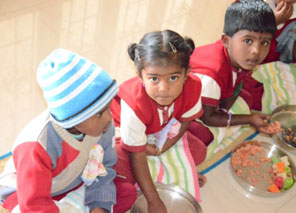Before School

After School

"I have studied the child. I have taken what the child has given me and expressed it and that is what is called the Montessori Method."
Maria Montessori
Our Montessori school is a "home-like" and “child-centered” environment which enables the children to develop their potentials in a creative way and to work independently at their own pace. We respect the unique individuality of each child. Our method does not compare a child to norms or principles that are considered by traditional educational systems. This approach to education helps to foster the needs, talents, and special individuality of each child. The main concept of our Montessori is to promote the joy of learning. Children, who experience the joy of learning, are happy, confident and fulfilled.
The children from mixed age groups are learning together in a “prepared environment”. We allow the younger ones to learn from the older ones based on practical activity. Here the children are allowed to explore and learn through scientifically designed Montessori materials and environments. The child is free to choose and work with the available material as long as she/he wants, under the proper guidance from the teacher.
Benefits of the Montessori approach
Montessori education helps our children with opportunities to develop their inner potential as they go out into the world as engaged, capable, responsible, respectful, caring and compassionate beings with a mutual understanding and gratitude that learning is for life.
- Every child is considered unique and appreciated.
- At an early age, our children develop order, coordination, concentration, self- confidence and independence.
- Children care for one another and enjoy freedom within limits.
- In contrast to standard Indian schooling, our aim is to help the children develop their potential through exploration and experimentation through the use of materials designed to sharpen their senses and awareness.
- Our children become enthusiastic, think well, work collaboratively, act boldly - a skill set for the 21st century.
Montessori Curriculum
The Primary areas that our Montessori education focuses on:
-
Exercises of Practical Life
The children are trained in practical exercises so that they could use them to develop the skills needed in everyday life, such as washing one’s hands, pouring water, putting on their shoes, using a handkerchief while sneezing or coughing or buttoning a shirt or blouse. These practical skills are basic in that once a child had mastered a particular skill, such as or buttoning, the skill could be transferred to the many occurrences when it was needed in daily life. The aim of the exercises is to move children from being dependent on adults to performing the exercises independently. Designed to exercise and develop motor, muscular, and coordination skills, the successful performance of everyday skills gave children a sense of independence and self-confidence that they could do things without adult assistance.
-
Sensorial exercises
The children develop their sensory perception and ability through sensory materials and activities. By using specially designed equipment and materials, children learn to classify and compare sensory impressions by touching, seeing, smelling, tasting, listening, and feeling the physical properties of the objects in the environment.
-
Arithmetic exercises
The children learn about the numbers through hands-on training using Montessori materials. Various materials are given to the children to learn the various mathematics concepts such as addition, subtraction, multiplication, division etc.
-
Language exercises
The children are guided for learning a language (English). This is achieved by first introducing the child to sounds of alphabets and then gradually to words. The sounds are not taught in alphabetical order; the principle behind this is that learning phonetics helps the child identify the sound and spell correctly. Another exercise is to trace letters and recognize them as a precursor to learning reading, spelling etc. Writing is taught only to four years children. Children are also taught grammar and how to form proper sentences.
-
Cultural development
Cultural activities help our children to develop his/her own personality, adapt to his/her own culture, and become independent. Children learn basics in art, planting seeds, music, action songs, storytelling etc.
The Teachers Role
In the beginning our Montessori teacher carefully observes the children in her class to discover the developmental needs of each individual child. Then comes the task of preparing the environment and the materials in it to meet the various needs of the individual children within the group. As the children begin to make free choices and interact and observe the materials, the teacher facilitates and guides their learning.
Environment: Our School Environment is very supportive, increasing the pupils’ confidence and encouraging them to reveal their personal interests, abilities and talents. The indoor and outdoor environment supports activities that are meaningful, providing the children with valuable learning experiences. Our school has resources and materials that are specifically made to meet Montessori standards. All of the equipment, including chairs and tables are all made in regard to children’s size and strength. Our educational approach is based on the children’s natural learning tendencies as they unfold in a “prepared environment” for mixed age groups.
Basic Requirements

During the day we provide nutritious meals for the children: breakfast (porridge with ginger water), noon meals (eggs, mixed vegetable rice, sambar, dhal, vegetables) and evening snacks (fruits, milk or biscuits). We also provide school uniforms and shoes for all children.
Health care

Once a year we organise a medical check-up for our Montessori children through Kodaikanal doctors or governmental hospital and nurses in Perumalmalai. During this day, the children are examined and undergo a general health check, a blood test and a full body check-up for all children.